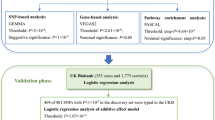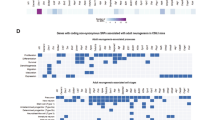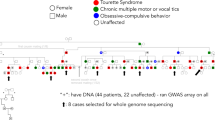Abstract
A 5-single nucleotide polymorphism (SNP) set has been associated with general cognitive ability in 5000 7-year-old children from the Twins Early Development Study (TEDS). Four of these SNPs were identified through a 10 K microarray analysis and one was identified through a targeted analysis of brain-expressed genes. The present study tested this association with general cognitive ability in six population samples of varying size and age from Australia, the UK (Scotland and England) and the Netherlands. Results from the largest sample (N=1310) approached significance (P=0.06) in the direction of the original finding, but results from the other samples (N=205–758) were mixed. A meta-analysis of the results – allowing for effect size heterogeneity between samples – yielded a non-significant correlation (r=−0.01, P=0.57), indicating that this SNP set was not associated with general cognitive ability in the populations studied.
Similar content being viewed by others
Log in or create a free account to read this content
Gain free access to this article, as well as selected content from this journal and more on nature.com
or
References
McClearn GE, Johansson B, Berg S et al: Substantial genetic influence on cognitive abilities in twins 80 or more years old. Science 1997; 276: 1560–1563.
Polderman TJ, Gosso MF, Posthuma D et al: A longitudinal twin study on IQ, executive functioning, and attention problems during childhood and early adolescence. Acta Neurol Belg 2006; 106: 191–207.
Papassotiropoulos A, Stephan DA, Huentelman MJ et al: Common Kibra alleles are associated with human memory performance. Science 2006; 314: 475–478.
Schaper K, Kolsch H, Popp J, Wagner M, Jessen F : KIBRA gene variants are associated with episodic memory in healthy elderly. Neurobiol Aging 2007 (in press).
Plomin R, Turic DM, Hill L et al: A functional polymorphism in the succinate-semialdehyde dehydrogenase (aldehyde dehydrogenase 5 family, member A1) gene is associated with cognitive ability. Mol Psychiatry 2004; 9: 582–586.
Butcher LM, Meaburn E, Dale PS et al: Association analysis of mild mental impairment using DNA pooling to screen 432 brain-expressed single-nucleotide polymorphisms. Mol Psychiatry 2005; 10: 384–392.
Gosso MF, de Geus EJ, van Belzen MJ et al: The SNAP-25 gene is associated with cognitive ability: evidence from a family-based study in two independent Dutch cohorts. Mol Psychiatry 2006; 11: 878–886.
Gosso MF, van Belzen M, de Geus EJ et al: Association between the CHRM2 gene and intelligence in a sample of 304 Dutch families. Genes Brain Behav 2006; 5: 577–584.
Plomin R, Kovas Y : Generalist genes and learning disabilities. Psychol Bull 2005; 131: 592–617.
Butcher LM, Meaburn E, Knight J et al: SNPs, microarrays and pooled DNA: identification of four loci associated with mild mental impairment in a sample of 6000 children. Hum Mol Genet 2005; 14: 1315–1325.
McGregor B, Pfitzner J, Zhu G et al: Genetic and environmental contributions to size, color, shape, and other characteristics of melanocytic naevi in a sample of adolescent twins. Genet Epidemiol 1999; 16: 40–53.
Wright M, De Geus E, Ando J et al: Genetics of cognition: outline of a collaborative twin study. Twin Res 2001; 4: 48–56.
Posthuma D, de Geus EJ, Mulder EJ, Smit DJ, Boomsma DI, Stam CJ : Genetic components of functional connectivity in the brain: the heritability of synchronization likelihood. Hum Brain Mapp 2005; 26: 191–198.
Deary IJ, Whiteman MC, Starr JM, Whalley LJ, Fox HC : The impact of childhood intelligence on later life: following up the Scottish mental surveys of 1932 and 1947. J Pers Soc Psychol 2004; 86: 130–147.
Rabbitt P, Diggle P, Holland F, McInnes L : Practice and drop-out effects during a 17-year longitudinal study of cognitive aging. J Gerontol B Psychol Sci Soc Sci 2004; 59: P84–P97.
Oliver B, Plomin R : Twins' Early Development Study (TEDS): a multivariate, longitudinal genetic investigation of language, cognition and behavior problems from childhood through adolescence. Twin Res Hum Genet 2007; 10: 96–105.
Bleichrodt N, Drenth PJD, Zaal JN, Resing WCM : Revisie amsterdamse Kinder Intelligentie Test [Revised Amsterdam Child Intelligence Test]. Lisse, The Netherlands: Swets and Zeitlinger BV, 1984.
Van Haasen PP, De Bruyn EEJ, Pijl YJ et al: Wechsler Intelligence Scale for Children-Revised. Dutch Version. Lisse, The Netherlands: Swets and Zeitlinger BV, 1986.
Wechsler D : WAIS-III Weschler Adult Intelligence Scale. San Antonio, Texas: Psychological Coorporation, 1997.
Scottish Council for Research in Education: The intelligence of Scottish children: A national survey of an age-group, Vol V London: University of London Press, 1933.
Deary IJ, Whalley LJ, Lemmon H, Crawford JR, Starr J : The stability of individual differences in mental ability from childhood to old age: follow-up of the 1932 Scottish Mental Survey. Intelligence 2000; 28: 49–55.
Raven JC, Court JH, Raven J : Manual for Raven's Progressive Matrices and Vocabulary Scales. London: HK Lewis, 1977.
Crawford JR, Deary IJ, Starr J, Whalley LJ : The NART as an index of prior intellectual functioning: a retrospective validity study covering a 66-year interval. Psychol Med 2001; 31: 451–458.
Nelson HE : National Adult Reading Test. Berkshire: NFER – Nelson Publishing Company, 1982.
SPSS Inc.: SPSS 13.0 for Windows. Chicago, Illinois: SPSS Inc., 2004.
Heim A : Intelligence and Personality: Their Assessment and Relationship. Harmondsworth, UK: Penguin, 1970.
Jensen AR : The g Factor: The Science of Mental Ability. Westport, CT: Praeger, 1998.
Wechsler D : Wechsler Intelligence Scale for Children. London: Psychological Corporation, 1992.
McCarthy D : Manual for the McCarthy Scales of Children's Abilities. New York: The Psychological Corporation, 1972.
Petrill SA, Rempell J, Oliver B, Plomin R : Testing cognitive abilities by telephone in a sample of 6–8-year olds. Intelligence 2002; 30: 353–360.
Abecasis GR, Cherney SS, Cookson WO, Cardon LR : Merlin-rapid analysis of dense genetic maps using sparse gene flow trees. Nat Genet 2002; 30: 97–101.
Duffy DL : SIB-PAIR: A Program for Elementary Genetical Analyses 2005, http://www2.qimr.edu.au/davidD/sib-pair.html.
Neale MC, Boker SM, Xie G, Maes HH : Mx: Statistical Modeling, VCU Box 900126 Richmond, VA: Department of Psychiatry, 1999.
Borenstein M, Hedges L, Higgins J, Rothstein H : Comprehensive Meta-analysis. Englewood NJ: Biostat, 2005.
Arden R, Harlaar N, Plomin R : Sex differences in childhood associations between DNA markers. Journal of Individual Differences, in press.
Harlaar N, Butcher LM, Meaburn E, Sham P, Craig IW, Plomin R : A behavioural genomic analysis of DNA markers associated with general cognitive ability in 7-year-olds. J Child Psychol Psychiatry 2005; 46: 1097–1107.
Davis OSP, Arden R, Plomin R : g in middle childhood: moderate genetic and shared environmental influence using diverse measures of general cognitive ability at 7, 9 and 10 years in a larger population sample of twins. Intelligence 2007; 36: 68–80.
Kovas Y, Haworth CMA, Dale PS, Plomin R : The genetic and environmental origins of learning abilities and disabilities in the early school years. Monogr Soc Res Child Dev 2007; 72: 1–144.
Bartels M, Rietveld MJH, van Baal GCM, Boomsma DI : Genetic and environmental influences on the development of intelligence. Behav Genet 2002; 32: 237–249.
Lin PI, Vance JM, Pericak-Vance MA, Martin ER : No gene is an island: the flip-flop phenomenon. Am J Hum Genet 2007; 80: 531–538.
Klein RJ, Zeiss C, Chew EY et al: Complement factor H polymorphism in age-related macular degeneration. Science 2005; 308: 385–389.
The Wellcome Trust Case Control Consortium: Genome-wide association study of 14 000 cases of seven common diseases and 3000 shared controls. Nature 2007; 447: 661–678.
Acknowledgements
We thank the participants and their families for their cooperation. Australian data collection was funded by ARC grants (A79600334, A79906588, A79801419, DP0212016, DP0343921) and the Human Frontiers of Science Program (HFSP; Grant rg0154/1998-B). Dutch data collection was supported by the Universitair Stimulerings Fonds (Grant 96/22), the HFSP (Grant rg0154/1998-B), and the Netherlands Organization for Scientific Research (NWO)/ Centre for Medical Systems Biology (CMSB) (Grant NWO/SPI 56-464-14192 & 904-57-94 and NWO/MaGW VIDI-016-065-318). The Lothian Birth Cohort 1921 is supported by the UK's Biotechnology and Biological Sciences Research Council. The Aberdeen Birth Cohort 1936 is supported by the Wellcome Trust. IJD is the recipient of a Royal Society-Wolfson Research Merit Award. Blood collection and DNA extraction for the Dyne Steele cohort was partly funded by Research into Ageing. The Twins Early Development Study is supported by the UK Medical Research Council (G0500079) and the Wellcome Trust (GR75492).
Author information
Authors and Affiliations
Corresponding author
Rights and permissions
About this article
Cite this article
Luciano, M., Lind, P., Deary, I. et al. Testing replication of a 5-SNP set for general cognitive ability in six population samples. Eur J Hum Genet 16, 1388–1395 (2008). https://doi.org/10.1038/ejhg.2008.100
Received:
Revised:
Accepted:
Published:
Issue date:
DOI: https://doi.org/10.1038/ejhg.2008.100
Keywords
This article is cited by
-
Genetic foundations of human intelligence
Human Genetics (2009)
-
The Impact of Genetic Research on our Understanding of Normal Cognitive Ageing: 1995 to 2009
Neuropsychology Review (2009)
-
Meeting the Challenges of Neuroimaging Genetics
Brain Imaging and Behavior (2008)



